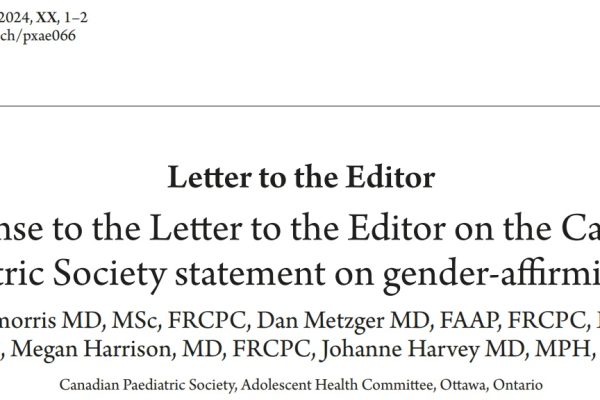Court ruling in UK means agenda-free psychotherapy needs to be explicitly exempted in Bill C-6.
Ottawa, ON, Thursday, December 3, 2020 — In a landmark ruling by the UK’s High Court this week, children and teens seeking puberty blockers or cross-sex hormones will need to apply for a court order to commence medical transition. This means that supportive psychotherapy services will become a default treatment pathway for gender distressed youth in the UK, something that is not considered within Bill C-6.
The purported goal of Bill C-6 is to ban the coercive and degrading practice of conversion therapy. But the language of the Bill targets services aimed at children in such an all-encompassing way that the effect will eliminate agenda-free psychotherapy services that can support trans-identified youth to manage or ameliorate gender dysphoria without pursuing an invasive medical pathway of transitioning.
Eva, Director of Detrans Canada, a recently formed group of Canadian detransitioners says “Bill C-6 is harmful to gender dysphoric children, and denies resources to young people with internalized homophobia, body dysmorphia and other mental health concerns that often accompany and generate gender dysphoria. This law will punish therapists who try to help us, ban life-saving therapies that our members need, and force gender dysphoric children on a trajectory towards unnecessary medical risks.”
There is significant debate around the world regarding the best way to treat gender dysphoria. The issue is receiving more scrutiny because of the recent exponential increase in young people, particularly a new population of adolescent girls, seeking gender transition. Referrals to Canadian gender clinics have increased more than 1,000% over the past decade.
At the same time, treatment protocols have changed to an informed consent model. Access to puberty blockers and cross-sex hormones has become very easy. Five out of 10 Canadian gender clinics no longer require any type of psychological assessment prior to starting puberty blockers or cross-sex hormones. Psychotherapy to resolve feelings of gender distress is considered a “barrier” to medical transition and in recent years has become synonymous with conversion therapy.
The UK high court, however, ruled that young people do not have the capacity to consent to these experimental medical treatments. A significant factor in their decision was the determination that the clinicians themselves do not fully understand the risks and benefits of the treatments. In their ruling, the court expressed “surprise” at the lack of scientific rigour in terms of tracking outcomes and understanding the efficacy of the interventions “given the young age of the patient group, the experimental nature of the treatment and the profound impact that it has”.
The UK’s National Health Service has updated their service specification for gender identity to reflect the new requirement of a “best interests” court order prior to referring children to a pediatric endocrinology clinic (gender clinic).
On informed consent laws in Canada, Lisa Bildy, a lawyer with the Justice Centre for Constitutional Freedoms, says “The situation varies by province, but generally, the onus is on the healthcare provider first to determine whether their young patient is competent to consent to care; and second to obtain their informed consent. The Bell case is a hopeful sign that courts are recognizing that children and adolescents may not be providing informed consent when signing up for puberty blockers. As the decision confirms, when puberty blockers are a probable first step on a path that includes cross-sex hormones and surgery, it is unlikely that a minor can actually understand what he or she is consenting to in terms of possible lost fertility or sexual function as an adult.”
The inclusion of gender identity in Bill C-6 will have the effect of using criminal law to interfere with decision making by health professionals in an area which is complex and poorly understood. The proposed law does not require the nature of the services targeted at children to be coercive in nature or be proven to cause harm, therefore the concern is that any and all psychotherapy services aimed at helping youth ameliorate feelings of gender dysphoria may become suspect as conversion therapy.
In testimony before the justice committee studying Bill C-6 this week, Dr Ken Zucker and Dr James Cantor expressed that the Bill in it’s current form is completely unacceptable. While there is a clear exemption for medicalized gender transition-related services, there is no equivalent clarity that would exempt evidence-based or agenda-free psychotherapy services for gender dysphoric youth. In order to come up with an appropriate exemption, Dr Zucker called on the government to “convene a panel of experts in treating gender dysphoria to come up with consensus guidelines”.
Now that mental health professionals will be heavily involved in developing exactly these kinds of guidelines and treatment protocols for the UK, it would be a serious mistake for the Canadian government to invoke a criminal law that limits the freedom of Canadian healthcare practitioners from applying evidence-based treatment protocols in Canada.
Canadian Gender Report, Detrans Canada and other grassroots organizations strongly oppose Bill C-6 because it will limit necessary and agenda-free psychotherapy services for trans-identified youth and will limit healthcare professionals from pursuing evidence-based, best-practice treatment pathways in this rapidly evolving field.
About Canadian Gender Report
Canadian Gender Report is a non-partisan, non-sectarian group concerned about the exponential increase in youth being referred for medical gender transitioning, the lack of evidence-based practice in our healthcare system with respect to these invasive medical interventions, the promotion of gender identity teaching in our education system and the lack of parental rights to act in the best interests of our children.
Media contact: Pamela Buffone


